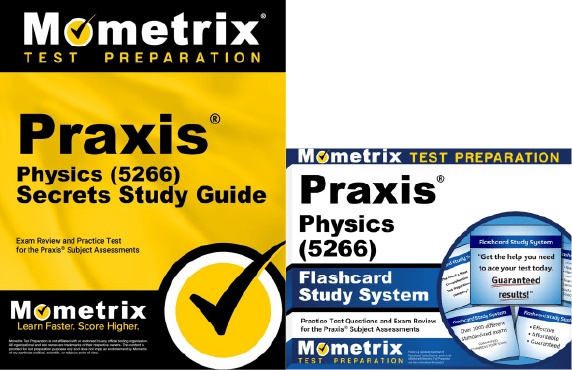If you need help studying for the Praxis® Physics test or just want some more information about what the test is like, you’ve come to the right place!
Click below to take a free Praxis Physics practice test!
What’s on the Exam?
First, let’s talk about the questions on the Praxis Physics test. There are 125 selected-response questions in total.
Selected-response questions can appear in several different forms:
- Single-selection multiple-choice
- Selecting ALL correct answers from a list of choices
- Selecting the correct answer from a drop-down menu
- Clicking parts of a graphic such as a map or a chart
- Dragging and dropping answers into a targeted area on the screen
The time limit for the test is 2.5 hours. There aren’t any scheduled breaks, but you’re free to take restroom breaks as needed!
Let’s take a closer look at the different sections of the Physics test:
1. Nature and Impact of Science and Engineering
15 questions
- The nature of scientific knowledge
- Experimental design
- Experimental data collection and analysis
- Lab procedures
- The interdependence of science, technology, and engineering
- Applying the engineering design process to the physics classroom
- Real-world environmental and societal problems impacted by technology
2. Principles and Models of Matter and Energy
19 questions
- Atomic and subatomic structures
- The relationship between atomic spectra and electron energy levels
- Nuclear processes
- Basic quantum physics
- Heat capacity
- Forms of energy
- Conceptual relationships of thermodynamics to physical processes
3. Mechanics
44 questions
- Motion
- Frames of reference
- Newton’s laws of motion
- Gravitation
- Weight, density, and mass
- Kepler’s laws of orbital motion
- Basic fluid mechanics
- Friction
- Uniform circular motion
- Harmonic motion
- Energy
- Linear momentum and impulse
- Rotational motion
- Collisions
4. Electricity and Magnetism
26 questions
- Electrostatics
- Conductors and insulators
- Electric current and capacitance
- Simple and combination circuits
- Generation of electric potential
- Magnetic fields, forces, and materials
- Relationships between electric and magnetic fields
4. Waves
21 questions
- Types of waves
- Wave phenomena
- Electromagnetic waves
- The electromagnetic spectrum
- Sound
- Geometric optics
How to Register
To register for the test, you’ll need to create an account on the ETS website. Once your account has been created, you can submit your application to take the test.
Praxis Scores
The Praxis Physics test is scored using a scaled scoring method. Here’s how it works:
For every question you answer correctly, you get one point added to your raw score. At the end of the test, your final raw score will be converted to a scaled score. This scaled score will range somewhere between 100 and 200.
The reason your raw score is converted to a scaled score is because everyone that takes the test is given a slightly different set of questions. Since everyone has a different arrangement of questions, and because some questions are harder than others, converting your raw score to a scaled score ensures a more even playing field.
FAQs
How many questions are on the Praxis Physics exam?
The exam contains 125 selected-response questions.
What is the time limit for the Praxis Physics exam?
The exam is timed at 2.5 hours.
What is the passing score for the Praxis Physics exam?
You’ll need to get a final scaled score of at least 145 in most states, but it does vary from state to state.
How much does the Praxis Physics exam cost?
The testing fee is $130.
Praxis is a registered trademark of Educational Testing Service, which is not affiliated with Mometrix Test Preparation and does not endorse this page.



 Praxis Study Guide
Praxis Study Guide Praxis Flashcards
Praxis Flashcards